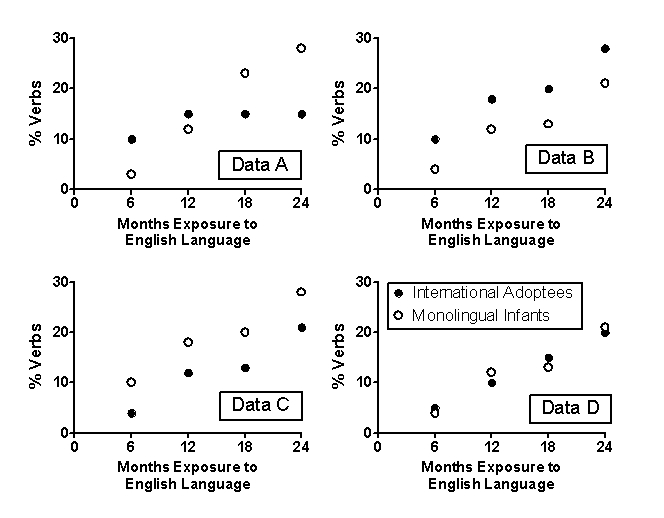Use the following to answer questions
Scenario I
Scenario I is based on and presents results consistent with the following studies:
Snedeker,J. ,Geren,J. ,& Shafto,C.L.(2012) .Disentangling the effects of cognitive development and linguistic expertise: A longitudinal study of the acquisition of English in internationally-adopted children.Cognitive Psychology,65(1) ,39-76.doi:10.1016/j.cogpsych.2012.01.004
Snedeker,J. ,Geren,J. ,& Shafto,C.L.(2007) .Starting over: International adoption as a natural experiment in language development.Psychological Science,18(1) ,79-87.doi:10.1111/j.1467-9280.2007.01852.x
Language development occurs in orderly stages,beginning with one-word utterances and progressing to two-word utterances,simple sentences containing function morphemes,and the emergence of grammatical rules.Psycholinguists have attempted to determine if language development is a consequence of cognitive development or if it reflects linguistic processes that occur independently of general cognitive development.Studies on the acquisition of a second language in internationally adopted children have provided insight into this research question.In a series of studies,Snedeker and colleagues (2007,2012) studied the acquisition of the English language in adopted preschoolers from China.These children had no exposure to the English language before being adopted by families in the United States.
Figure 9.1 
-(Scenario I) Which reason BEST explains why the research question posed in Scenario I could not be answered by studying infants' acquisition of the English language and comparing it with infants' acquisition of the Spanish language in American-born bilingual homes?
Definitions:
Monozygotic Twin
Twins that are genetically identical, having developed from a single fertilized egg that split into two.
Dizygotic Twin
Twins that are formed from two separate fertilized eggs, also known as fraternal twins, sharing about 50% of their genetic makeup.
Homosexual
A term used to describe an individual who is attracted emotionally, romantically, or sexually to members of the same sex.
Sexual Orientation
A natural and unchangeable, long-lasting attraction towards others, whether emotional, romantic, or sexual.
Q2: People who are _ motivated tend to
Q10: The behaviorist approach to language development suggests
Q11: Isaac wants to exploit findings consistent with
Q23: When people have identical genes,the differences in
Q37: Who studied color perception in the Dani,an
Q60: The average 1-year-old has a vocabulary of
Q74: According to Thurstone's theory,the primary mental abilities:<br>A)correspond
Q155: _ intelligence is the ability to see
Q175: Despite training,apes may have trouble learning to
Q229: Which expression is a morpheme?<br>A)b<br>B)boy<br>C)the boy<br>D)the boy